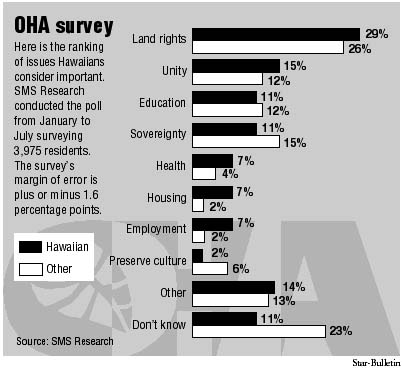

Land rights top
concern for Hawaiians,
OHA survey says
Unity, education, sovereignty,
By Pat Omandam
health and housing follow,
according to OHA
Star-BulletinFor years, critics have said Office of Hawaiian Affairs trustees didn't know what the Hawaiian people want.
Now, trustees can say they do.
OHA revealed the first results of a massive $100,000 survey yesterday that showed the issue of land rights was the most important for Hawaii's native people, followed by Hawaiian unity, education, sovereignty, health and housing.
The goals of the telephone survey were to measure public opinion on issues of interest to OHA and Hawaiians, public reaction to OHA programs and to allow OHA to track public opinion over time, said Jim Dannemiller, president of SMS Research & Marketing Services Inc.
"Essentially, what we wanted to do is represent Hawaiians on one hand, and represent the general public on the other," he said yesterday.
SMS Research conducted the poll using the OHA voter list and random digit-dialing of telephone numbers. Of the 3,975 respondents, 1,764 or 44 percent said they were of Hawaiian ancestry.
Dannemiller said the January-to-July poll's sample size gives an accurate pulse of public opinion because it is about 10 times the normal sample size of 400. The survey's margin of error is plus or minus 1.6 percentage points.

Also, the company set up key interviews with 15 local opinion leaders in the business, Hawaiian, religious, legal, health and government communities to gauge their opinions on the survey questions. Their results jibed with that of the respondents, he said.Dannemiller added the results shared with trustees yesterday only "scratched the surface" of the data collected. The entire report will be presented to OHA on Friday. Trustees will use the data for long-range planning, to help shape next year's budget and to raise public awareness of certain issues.
While the issue of sovereignty was overwhelmingly recognized by all, more non-Hawaiians than Hawaiians actually ranked it as the most important issue. About 15 percent of nonnative people said it was the top issue, compared to only 11 percent of Hawaiians.
OHA Chairwoman Rowena Akana said the disparity is likely because non-Hawaiians are interested in knowing how sovereignty would affect them.
The controversial issue of land rights topped the most important issue list for both groups. Hawaiian unity was next for both groups, followed by education, sovereignty, health, housing and employment.
"Obviously, the Hawaiians and even the non-Hawaiians see the issue as land rights," said trustee Haunani Apoliona.
On the position of sovereignty, 47 percent of Hawaiians and 42 percent of non-Hawaiians favored parts or all of it, while a third were opposed to sovereignty.
And more than 70 percent of Hawaiians said a sovereign entity should have control of natural resources on its land and be responsible for its own economic development -- which leads to true independence, said OHA trustee Mililani Trask.
"Real independence is not independence from the U.S., real independence is economic independence," said Trask, who added Hawaiians have never given up their quest for their land.
More than half of the Hawaiians polled believe a sovereign government should accept return of all ceded lands, be able to enter into international relations, have control over immigration issues, have its own courts and legal system and its own money and banking system.
At the bottom of the list, only 32 percent of Hawaiians said a sovereign entity should be completely independent from the United States.
"The lower showing is not a surprise at all," Trask said. "Every single poll every taken shows no support for that."
Trask said the preliminary data from SMS Research did miss some key questions she wanted to see, such as what is the meaning of sovereignty and whether a sovereign nation should be independent and control its own land.
Meanwhile, other initial results from the poll show:
96 percent of Hawaiians polled believe the blood quantum to qualify for federal programs should be lowered or eliminated. The other 4 percent said they did not know what should be done.
Akana said Hawaiians overwhelmingly feel there should be no blood quantum that divides their people.
69 percent of Hawaiians would vote in an election to select delegates to a Native Hawaiian Constitutional Convention, although 78 percent said Hawaiians should wait until they can understand the issues better.
January '97 OHA Ceded Lands Ruling